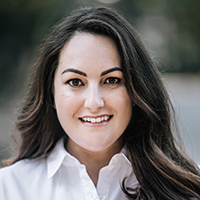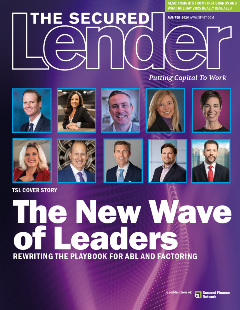
Kennedy Capin
Executive Director , JPMorgan Chase Commercial Banking
Kennedy Capin is an executive director and senior originator in Asset Based Lending (ABL) for JPMorgan Chase Commercial Banking. Kennedy has been with JPMorgan Chase’s ABL group since 2011, holding roles of increasing responsibility in Atlanta, New York and London. Since 2017, Kennedy has been responsible for the sales, structuring and execution of complex international ABL solutions for multi-national corporate clients. She has also worked in credit risk as a credit analyst, portfolio manager and senior underwriter.
Kennedy has been instrumental in several ABL cross-border innovation and business-process improvement initiatives, which ensure ABL retains its competitive advantage and delivers a positive client experience. She’s also been closely involved with multiple JPMorgan talent development and diversity initiatives. These include developing Commercial Banking’s EMEA-based Culture Council, serving on the Leadership Team for the Black Organization for Leadership and Development’s EMEA chapter and volunteering for the firm’s Service Corps program. She received a BS in business management, with focuses in both accounting and corporate finance, from the University of South Carolina. Originally from Hilton Head Island, South Carolina, Kennedy currently lives in London with her husband, Seth, and enjoys cooking, traveling, and scuba diving.
What advice would you offer to women just starting out in the industry?
Give yourself some permission to make mistakes along the way and know those mistakes won’t be fatal. Learn from them all the same and move on, instead of obsessing or beating yourself up too much.
Perception is often reality, so be conscious of your words and your actions. Equally, be your unique self all the time, not just at home. Judy Garland said it best when she said, “Always be a first-rate version of yourself, instead of a second-rate version of somebody else.”
Regularly evaluate what you enjoy working on and what you don’t, as well as what success looks like to you and what you think it will take to get there. Then, tell your manager and your advocates. Remember, your success benefits you, your team, and your firm.
What do you know now that you wish you knew in the beginning of your career?
At the beginning of my career, I wish I knew how to be more balanced in my approach to work. My personality leans more introverted, and I tend to easily lose myself in work. To be successful and get ahead, you can’t solely rely on working hard, despite the importance of that quality. You also need to be visible, networking both internally and externally, and have strong communication and emotional intelligence skills. The combination of those things will set you apart. I also wish that I knew it was healthy and necessary to establish boundaries between your work life and your personal life and that asking for help to achieve this does not mean you have failed.
Lastly, don’t allow yourself to become paralyzed if you don’t know the answer, or if you don’t have all the answers you think you need to make a decision. Instead, it’s OK to say “I don’t know; let me follow up” but also get comfortable making decisions based on the best information you have at the time you have it.
How do you balance work/personal time?
The idea of balance with work and life is somewhat of an oxymoron. They are rarely equal in terms of time spent, often in a state of flux and different from person to person. But I have found it helpful to identify some personal non-negotiables, which are a couple of things that I need to do each week regardless of my schedule.
During the work week and more days than not, I cook dinner at home with family and sit down to eat and chat uninterrupted by work. Another item is one full day on the weekend where no work is done. Ideally it would be both days, but I definitively aim for one day when I don’t even check my emails. I’ve also found that openly communicating my schedule and limits to teammates often make it easier for others to plan accordingly.
One new item I am determined to do better this year is take vacation more evenly throughout the year, instead of in a big chunk at the end of the year or during the summer (or worse, carrying over unused days). I need and want the breaks more often and have a natural inclination to not work on shorter vacations.
The Secured Lender

SFNet's The Year Ahead Issue


